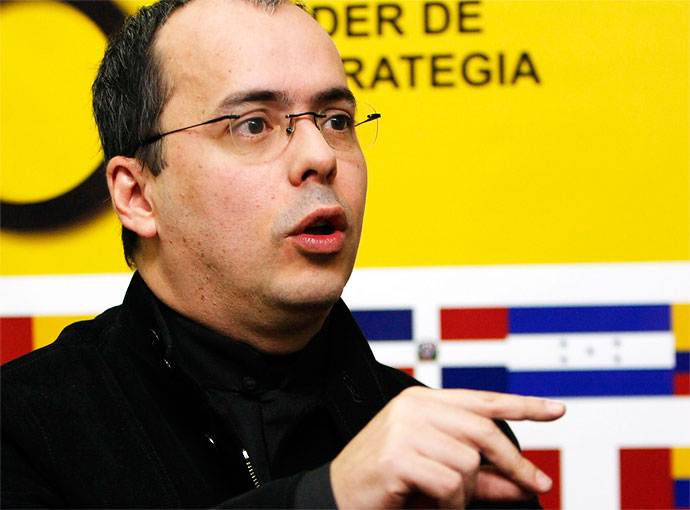
If you haven’t had a chance yet, you should drop everything to read the amazing 4500-word-plus scoop from Bloomberg about the potentially criminal role of hacking in the political universe of J.J. Rendón and his still-unclear ties to Andrés Sepúlveda, a Colombian hacker now serving a decade-long prison sentence for hacking, espionage and other crimes related to the 2014 Colombian election.![]()
![]()
Even if you take Sepúlveda’s accusations with a fair share of skepticism, that he’s sitting in jail and subject to such heavy security from the Colombian government lends at least some credence — and the chicanery in that 2014 election is only one example in a story that looks and feels like it was ripped right out of the latest season of House of Cards:
He says he wants to tell his story because the public doesn’t grasp the power hackers exert over modern elections or the specialized skills needed to stop them. “I worked with presidents, public figures with great power, and did many things with absolutely no regrets because I did it with full conviction and under a clear objective, to end dictatorship and socialist governments in Latin America,” he says. “I have always said that there are two types of politics—what people see and what really makes things happen. I worked in politics that are not seen.”
The very mention of Rendón’s name can strike fear into the heart of an opponent in any Latin American election. He’s been called the ‘Karl Rove’ of Latin America and, it’s true, he’s helped dozens of center-right candidates win office. He helped boost Juan Manuel Santos, both when he was minister of defense in Colombia, and in the 2010 election, in which Santos won the presidency.
In 2014, however, after Santos launched landmark peace talks with FARC and Santos’s one-time mentor, former president Álvaro Uribe, turned on Santos, Sepúlveda found himself working for a right-wing opponent Óscar Iván Zuluaga, who wanted to end the peace talks. Though Zuluaga narrowly won the first round, Santos triumphed in the runoff, and the talks have deepened and progressed in Santos’s second term. (Rendón was working for Santos, though he resigned after accusations linking him financially to drug cartels.)
It’s not just Colombia, though.
Perhaps the most audacious of Sepúlveda’s stories come from Mexico, where he and Rendón worked for the 2012 election of Mexico’s current president, Enrique Peña Nieto, restoring the centrist and once all-powerful Partido Revolucionario Institucional (PRI, Party of the Institutional Revolution) to power. Sepúlveda brags about hacking the phones, agendas, emails and internal memos of opponents, about deploying tens of thousands of fake Twitter accounts to slander candidates, or even, in one Jalisco race, organizing thousands of false-flag telephone calls to go out to voters at 3 a.m., angering the electorate at the supposed perpetrator.
Dirty tricks are nothing new, of course, but Sepúlveda pulls back the curtain on the possibilities of 21st century cyber-warfare — in government as much as in political campaigns.
What’s staggering or, perhaps, even reassuring, is that Rendón and Sepúlveda so often failed. They couldn’t dislodge chavismo in the 2012 and 2013 presidential elections, obviously failed in Colombia’s 2014 election, and their candidates lost races in Panama, Nicaragua and, most amazingly, Costa Rica (where San José’s mayor Johnny Araya did so poorly that he dropped out than compete in a runoff). Though they worked for Porfirio Lobo Sosa and Juan Orlando Hernández in the 2009 and 2013 presidential elections, respectively, in Honduras, reasonable observers would agree that the political climate and incumbent power already gave each of Lobo and, especially, Hernández, inherently unfair advantages.
Perhaps the biggest success is Mexico, where Peña Nieto’s early lead in the 2012 race was softer than it seemed, and there was a time when former Mexico City mayor and the two-time candidate of the Mexican left, Andrés Manuel López Obrador, looked like he might make a come-from-behind push to win. Amazingly, he’s still a leading candidate for the 2018 race (in which the now unpopular Peña Nieto cannot run, due to term limits).
It’s difficult to imagine that the Caracas-born Rendón, who now lives in Miami, will face charges in the United States on the basis of Sepúlveda’s admissions. But it does call into question whether the ‘Rendonization’ of Latin America is coming to an end, especially after Rendón himself became toxic to the Santos campaign two years ago.
That, in particular, could make Rendón too politically radioactive to help with the project most clearly important to him — ending the chavista era in Venezuela. With a newly ascendant opposition in control of the national assembly and promising to bring a recall vote against beleaguered president Nicolás Maduro, Rendón’s absence would be a particularly difficult blow in what could yet be an ugly showdown in his native Venezuela.
Wow;8#230&..I truly appreciate this post. I’ve been looking everywhere for this! Thank goodness I found it on Bing. You have made my day! Thank you again! “Every time we remember to say thank you, we experience nothing less than heaven on earth.” by Sarah Ban B…